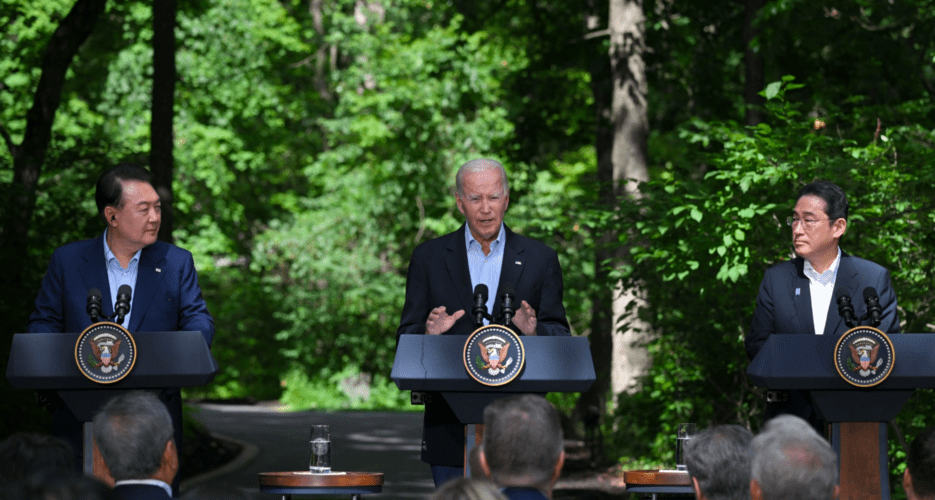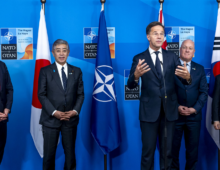In a move to bolster regional cooperation, U.S. President Joe Biden, South Korean President Yoon Suk-yeol and Japanese Prime Minister Fumio Kishida convened at Camp David. The leaders released a joint statement titled “The Spirit of Camp David,” emphasizing their shared commitment to broadening cooperation across various domains, including strengthening their economies, supporting a free and open international order, bolstering peace and security and promoting democracy and human rights. The leaders expressed concerns about “aggressive behavior” in the South China Sea by the People’s Republic of China. The statement also underscores their commitment to the complete denuclearization of the DPRK.
The summit also saw the introduction of the “Camp David Principles,” a set of guidelines aimed at fostering mutual trust and understanding among the three nations. These principles highlight the importance of a free and open Indo-Pacific, support for ASEAN centrality and unity, engagement with Pacific Island countries and economic cooperation through “open and fair economic practices.” Further, the “Commitment to Consult” document unveiled the three leaders’ decision to meet in person at least annually to build on the momentum of the Camp David Trilateral Leaders’ Summit, thereby institutionalizing their trilateral cooperation.
During a joint press conference, Biden lauded the strength of the trilateral relationship, emphasizing its pivotal role in ensuring regional stability. Yoon and Kishida echoed these sentiments, with Yoon emphasizing the importance of a united approach to North Korea and Kishida underscoring the significance of economic collaboration.
Why It Matters
The three leaders have hailed the Camp David summit as a significant step forward in trilateral cooperation. However, the summit’s outcomes may not be as groundbreaking as the three leaders project. Although the “Commitment to Consult” document emphasizes cooperation, it explicitly states that it neither supersedes nor infringes on existing defense treaties between the two East Asian nations and the U.S. Further, it doesn’t intend to create any new rights or obligations under international or domestic law. While the document promotes dialogue, it doesn’t bind the nations into a new alliance.
The fragility of this newfound cooperation becomes evident when considering the political landscapes in South Korea and Japan. Limited to a five-year term, Yoon might see his successor from the opposition party, known for its cooler stance toward Japan, who could overturn the agreement. Meanwhile, in Japan, Kishida has grappled with a dwindling approval rate. Speculation about a snap election looms, and a more hawkish successor could jeopardize trilateral cooperation.
The three leaders’ push to institutionalize consultation and meetings aim to cement trilateral cooperation beyond their tenures. However, the U.S. political scene adds another layer of unpredictability. Despite Donald Trump’s mounting legal challenges, his potential return to the White House in 2024 cannot be ruled out. Such a shift could reshape U.S. foreign policy, adding another variable to the trilateral equation. In sum, while the Camp David summit symbolizes a united front, the path ahead remains uncertain.
In a move to bolster regional cooperation, U.S. President Joe Biden, South Korean President Yoon Suk-yeol and Japanese Prime Minister Fumio Kishida convened at Camp David. The leaders released a joint statement titled “The Spirit of Camp David,” emphasizing their shared commitment to broadening cooperation across various domains, including strengthening their economies, supporting a free and open international order, bolstering peace and security and promoting democracy and human rights. The leaders expressed concerns about “aggressive behavior” in the South China Sea by the People’s Republic of China. The statement also underscores their commitment to the complete denuclearization of the DPRK.
The summit also saw the introduction of the “Camp David Principles,” a set of guidelines aimed at fostering mutual trust and understanding among the three nations. These principles highlight the importance of a free and open Indo-Pacific, support for ASEAN centrality and unity, engagement with Pacific Island countries and economic cooperation through “open and fair economic practices.” Further, the “Commitment to Consult” document unveiled the three leaders’ decision to meet in person at least annually to build on the momentum of the Camp David Trilateral Leaders’ Summit, thereby institutionalizing their trilateral cooperation.
Get your
KoreaPro
subscription today!
Unlock article access by becoming a KOREA PRO member today!
Unlock your access
to all our features.
Standard Annual plan includes:
-
Receive full archive access, full suite of newsletter products
-
Month in Review via email and the KOREA PRO website
-
Exclusive invites and priority access to member events
-
One year of access to NK News and NK News podcast
There are three plans available:
Lite, Standard and
Premium.
Explore which would be
the best one for you.
Explore membership options












